Fly Season May be Ending but Ticks are Coming, Putting Horses at Risk For Lyme Disease
October 10, 2014 Comments Off on Fly Season May be Ending but Ticks are Coming, Putting Horses at Risk For Lyme Disease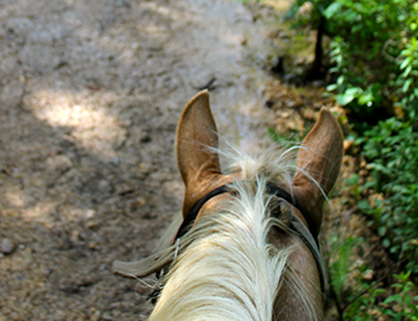
The life cycle of a tick puts horses at high risk for being bitten during the fall months, particularly in the Northeast and Mid-Atlantic states.
Continue reading …Feeding a Whole Food Diet to Horses – A Free Oct. Webinar
October 10, 2014 Comments Off on Feeding a Whole Food Diet to Horses – A Free Oct. Webinar
“Feeding horses doesn’t have to be difficult,” said Tigger. “My goal is to help break down the barriers of confusing labels and feeding programs so that individuals can provide better health to themselves and their horses, and improved performance in the show ring.”
Continue reading …What a Great Idea! Having a School Study Center by the Horse Show Ring
October 9, 2014 Comments Off on What a Great Idea! Having a School Study Center by the Horse Show Ring
As many parents are well aware, having their young equestrians miss school to compete at horse shows can be a tricky proposition when it comes to strict attendance policies. Often, a conversation must take place beforehand, including the teachers and sometimes the principal, in order to come up with a plan for making up missed work, rescheduling test dates, turning in work early, or even emailing or faxing assignments from the road.
Continue reading …It’s Blanket Season! Here’s What You NEED to Know Before Going Shopping
October 7, 2014 Comments Off on It’s Blanket Season! Here’s What You NEED to Know Before Going Shopping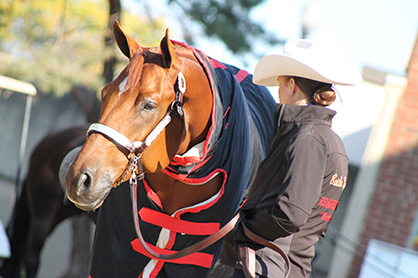
The term denier describes the strength of the blanket, so if you have a horse notorious for ripping his sheet or blankets, you want to have the highest denier number—2100. Medium strength blankets are 600.
Continue reading …Training Your Horse to Express His Blanket Preference…?
October 6, 2014 Comments Off on Training Your Horse to Express His Blanket Preference…?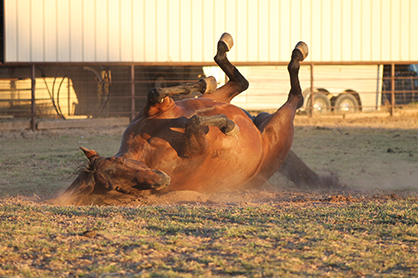
The horses’ preferences were tested under differing weather conditions including sunshine, wind, rain/snow and temperatures ranging from -15 to +20 °C. Horses were left outdoors for two hours before being given the choice to change, or not change, blanket status.
Continue reading …Survey Shows 20% of Horse Owners Unaware of Encysted Small Redworm Risk
October 3, 2014 Comments Off on Survey Shows 20% of Horse Owners Unaware of Encysted Small Redworm Risk
Encysted small redworms are one of the most common and harmful worms found in horses. They are the larval stages of the small redworm that have buried into the lining of the gut where they can lie dormant for some time. They pose a potentially fatal health risk but won’t show up in a standard faecal worm egg count.
Continue reading …Botulism: May Be Good For Wrinkles, But It’s Deadly For Horses
October 1, 2014 Comments Off on Botulism: May Be Good For Wrinkles, But It’s Deadly For Horses
There are some antitoxin products for treating horses with botulism, but since the disease can kill a horse quickly, it’s best to try to prevent it. Unfortunately, there is no vaccine that covers all types.
Continue reading …How to Protect All Your Furry Four-Legged Creatures From the Winter Chill
October 1, 2014 Comments Off on How to Protect All Your Furry Four-Legged Creatures From the Winter Chill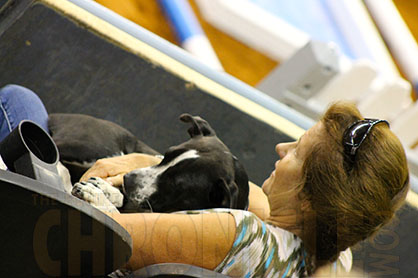
As the weather becomes colder, and pets need more of their energy to remain warm, it is sometimes necessary to cut back on your pet’s physical activity. Depending on the thickness of your pet’s coat, it is advised to cut their time outside short.
Continue reading …Disaster Preparedness For Horse Owners
September 26, 2014 Comments Off on Disaster Preparedness For Horse Owners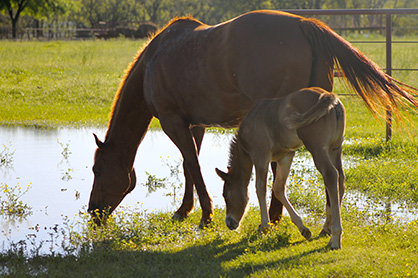
Consider different types of disasters and whether your horses would be better off in a barn or loose in a field.
Continue reading …SNAKE! Tips to Help Keep Your Horses and Pets Safe
September 23, 2014 Comments Off on SNAKE! Tips to Help Keep Your Horses and Pets Safe
“Horses, sheep and cattle are also susceptible to snake venom. Signs include muscle tremor, labored breathing and dilated pupils followed by paralysis.”
Continue reading …







